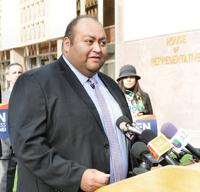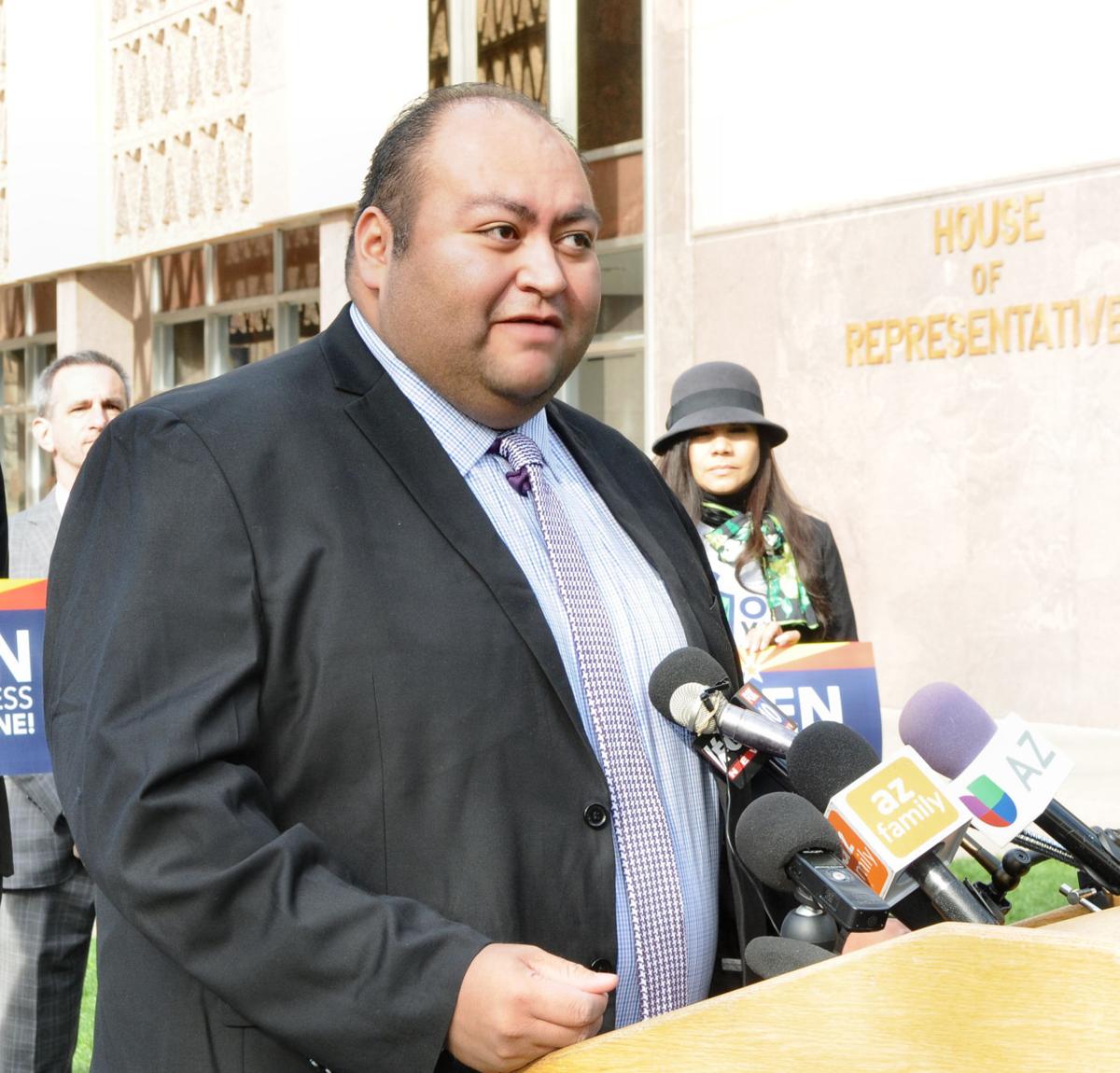The video opens with the sound of a cellphone buzzing and barely audible sirens starting to rise.
A voice leaves a halting message: “Mom. Don’t worry about me. I’m fine. But something’s happened to Gabby. It’s bad. I have to go.”
That voice belongs to Daniel Hernandez Jr., candidate for the Democratic nomination in the new Congressional District 6. And it describes the situation he is best known for, even after a decade in public office — how he helped then Rep. Gabrielle Giffords after she was shot in the head on Jan. 8, 2011.
Similarly his first campaign ad, released last week, begins with President Barack Obama calling Hernandez a hero for his actions that helped save Giffords’ life.
The Jan. 8 mass shooting overhangs our politics still, sometimes in ways that survivors find off-putting or triggering. And now, a new documentary on Gabby Giffords is coming out, with the usual political and emotional ramifications.
The movie, “Gabby Giffords Won’t Back Down,” opens in theaters July 15. It documents her transformation from a congresswoman with big potential to the victim of an assassination attempt, through her brutal recovery and conversion into an activist for gun safety.
It’s hard to know what the right way is to deal with the tragic attack that shook Tucson 11 years ago.
What’s right for a political campaign may not be right for survivors.
What’s right for Democrats probably isn’t right for Republicans.
And the people involved, of course, have the right to their own stories.
Survivors lose favorite
But I know I find the political deployment of the mass shooting increasingly discordant. After watching Hernandez’s ad and biographical video, I checked in with a handful of Jan. 8 shooting survivors to hear what they thought.
They’re an interesting group, because many survivors have stuck together and tried to pivot from the shooting toward their own activism, largely focused on reducing gun violence. But they’re also individuals with their own points of view.
Dr. Randy Friese had been their guy in the race for this new district, which covers much of the Tucson area and most of southeastern Arizona. Friese was the trauma surgeon who treated Giffords and 9-year-old Christina-Taylor Green after the mass shooting. He went on to serve in the Legislature.
But Friese suddenly dropped out of the race. That left them choosing in the Democratic primary between Hernandez, whom many of them worked with when he headed the Everytown for Gun Safety group in Arizona, and former state Sen. Kirsten Engel, a law professor at the UA.
Surprisingly many chose Engel. Among them was Ron Barber, who held Giffords’ seat after she was forced to resign, although he too was shot on Jan. 8. So did Pam Simon and Pat Maisch, both survivors who have worked with Hernandez.
But he was endorsed by Everytown, which remains one of the country’s biggest anti-gun-violence groups.
Important to remind
Among the four survivors I asked about Hernandez’s ad, Barber expressed the most discomfort in how Hernandez used the Tucson mass shooting in his political videos.
“It’s his right to do that, but I just don’t think it’s a good idea. I think it’s exploitative,” Barber said. “A lot of people who were survivors are concerned about any of us promoting ourselves as survivors.”
Fellow survivors Simon and Maisch had conflicted feelings about Hernandez using his Jan. 8 experience to introduce himself that way.
“We all love and admire Daniel,” Simon said. “I would think voters would be more interested, or should be more interested, in what his experience has been as an elected official and how he feels he’s ready to go to Congress. What he’s doing is reminding voters what he’s best known for.”
Mary Reed, another survivor, told me his ads don’t give her “any kind of emotional response.”
“We all can identify ourselves in whatever way we choose,” she said. “I choose not to introduce that when people meet me.”
But of course, none of them is running in a competitive race for office, with the crying need to ensure that voters know who you are. That in essence, is why Hernandez keeps reminding people of his role on Jan. 8, 2011, even though it was 11 years ago now.
“I think it’s important for me to remind people,” Hernandez told me Friday. “People remember me for that.”
The idea, Hernandez said, is “lead with what people know because that’s how people first met me, then follow up with what I’ve done since.”
Inspired by tragedy
As a Democrat in a Republican-controlled Legislature, though, he hasn’t been able to achieve a lot. Under the administration of Gov. Jan Brewer, he said, he helped push through an improvement in the information the state puts into the federal background-check system for gun purchases, so more ineligible buyers are tagged.
On guns, though, Hernandez said, many of his achievements have been defensive, such as repeatedly stopping bills put forward to allow guns on university campuses.
“We’ve had a lot of success killing bad legislation,” he said.
Hernandez isn’t alone in using his Jan. 8 experience in his political introduction. Friese did it, too, when he first ran for Legislature in 2014. They eased off that in subsequent campaigns though, his former campaign manager, Cheryl Cage, told me.
“It was part of his story, but it became less and less as he did more in politics,” Cage said.
And of course, there is an inevitable tie-in between Giffords’ experience of being shot and miraculously surviving, and the political career of her husband, Sen. Mark Kelly. Like Hernandez and Friese, Kelly didn’t become a candidate until the experience and issue of gun violence inspired them.
I was there in March 2013, at the parking lot outside the Safeway where the mass shooting took place, when Kelly first ventured out from relative political neutrality and into the issue of gun-safety laws, arguing for a bill that would establish universal background checks.
He didn’t say “My wife was shot in an assassination attempt” because he didn’t have to. She was there standing next to him.
Similarly, the launch this week of the new documentary doesn’t serve directly as a campaign video for Kelly, who is being targeted by Republicans as a vulnerable Democratic senator this year. But the movie inevitably reminds Arizona voters of something most liked about him — his support for his wife after she was shot, and his association with her generally.
The movie itself, and the reminders from campaign ads such as Hernandez’s one, can be triggering for some of the survivors here in Tucson. If you experienced it, the reminder can bring back those awful days in traumatic ways.
But politics is not about subtlety. I would love Hernandez to have something else to remind voters of who he is, something that doesn’t remind people of that day. But I can grudgingly grasp why he uses the best possible example.





